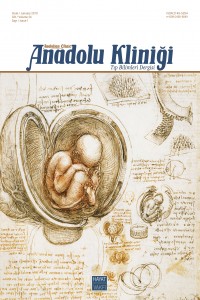Öz
Amaç: Bu çalışmada evrensel titanyum protezler kullanılarak ossiküloplasti yapılan hastalarda ameliyat öncesi ölçülen orta kulak risk indeksi (OKRİ) ve intraoperatif kemikçik zinciri bulgularının postoperatif işitme üzerine etkilerini değerlendirmek amaçlanmıştır.
Gereç ve Yöntemler: Çalışmaya inkusu arızalı olup evrensel titanyum protez kullanılarak kulak cerrahisi yapılan hastalar dahil edildi. Preoperatif kulak muayenesi sonuçları, OKRİ skorları ve ameliyat bulguları değerlendirildi. Preoperatif ve postoperatif hava iletimi ve kemik iletimi işitme eşikleri ve hava-kemik aralığı 0,5, 1, 2 ve 4 kHz frekanslarında değerlendirildi.
Bulgular: Çekiç kemiği ve üzengi suprastrüktürü varlığının ve prognostik OKRİ derecelendirmesinin rekonstrüksiyon başarı oranını etkilediği görüldü. Hava-kemik aralığı sonuçları hafif, orta ve ağır OKRİ gruplarında sırasıyla %100, %87,5 ve %12,5 olarak tespit edildi.
Tartışma ve Sonuç: Literatürle uyumlu olarak, preoperatif OKRİ skorlarının cerrahlara ossiküloplasti sırasında rehberlik ederek hastaya özel operasyon stratejisi geliştirmede yardımcı olabileceği görülmüştür.
Anahtar Kelimeler
işitme rekonstrüksiyonu kulak cerrahisi orta kulak risk indeksi timpanoplasti
Kaynakça
- Op. Dr. Hasan Demirhan
- Doç Dr. Selahattin Tuğrul
An evaluation of prognostic factors for tympanoplasty with titanium prostheses in chronic ear surgery
Öz
Aim: This study aimed to assess the effects of preoperatively measured middle ear risk index (MERI) and intraoperative ossicular chain findings on postoperative hearing in patients who underwent ossiculoplasty performed by using universal titanium prostheses.
Materials and Methods: Patients who underwent ear surgery using universal titanium prostheses due to malfunctioning in the incus were included. Preoperative ear examination results, surgical findings, and MERI scores were assessed. Preoperative and postoperative air-conduction and bone-conduction hearing thresholds and air-bone gap were assessed at 0.5, 1, 2, and 4 kHz frequencies.
Results: We found that presence of the malleus and stapes suprastructure and prognostic MERI grading affected the reconstruction success rate. The air-bone gap results were found to be 100%, 87.5% and 12.5% in the mild, moderate, and severe MERI groups, respectively.
Discussion and Conclusion: In line with the literature, we observed that preoperative MERI scoring might help surgeons develop a patient-specific operation strategy by providing guidance during ossiculoplasty
Anahtar Kelimeler
Hearing Reconstruction Middle Ear Risk Index Tympanoplasty Chronic ear surgery
Kaynakça
- Op. Dr. Hasan Demirhan
- Doç Dr. Selahattin Tuğrul
Ayrıntılar
| Birincil Dil | İngilizce |
|---|---|
| Konular | Sağlık Kurumları Yönetimi |
| Bölüm | ORJİNAL MAKALE |
| Yazarlar | |
| Yayımlanma Tarihi | 30 Ocak 2019 |
| Kabul Tarihi | 15 Ağustos 2018 |
| Yayımlandığı Sayı | Yıl 2019 Cilt: 24 Sayı: 1 |
Cited By
This Journal licensed under a CC BY-NC (Creative Commons Attribution-NonCommercial 4.0) International License.


